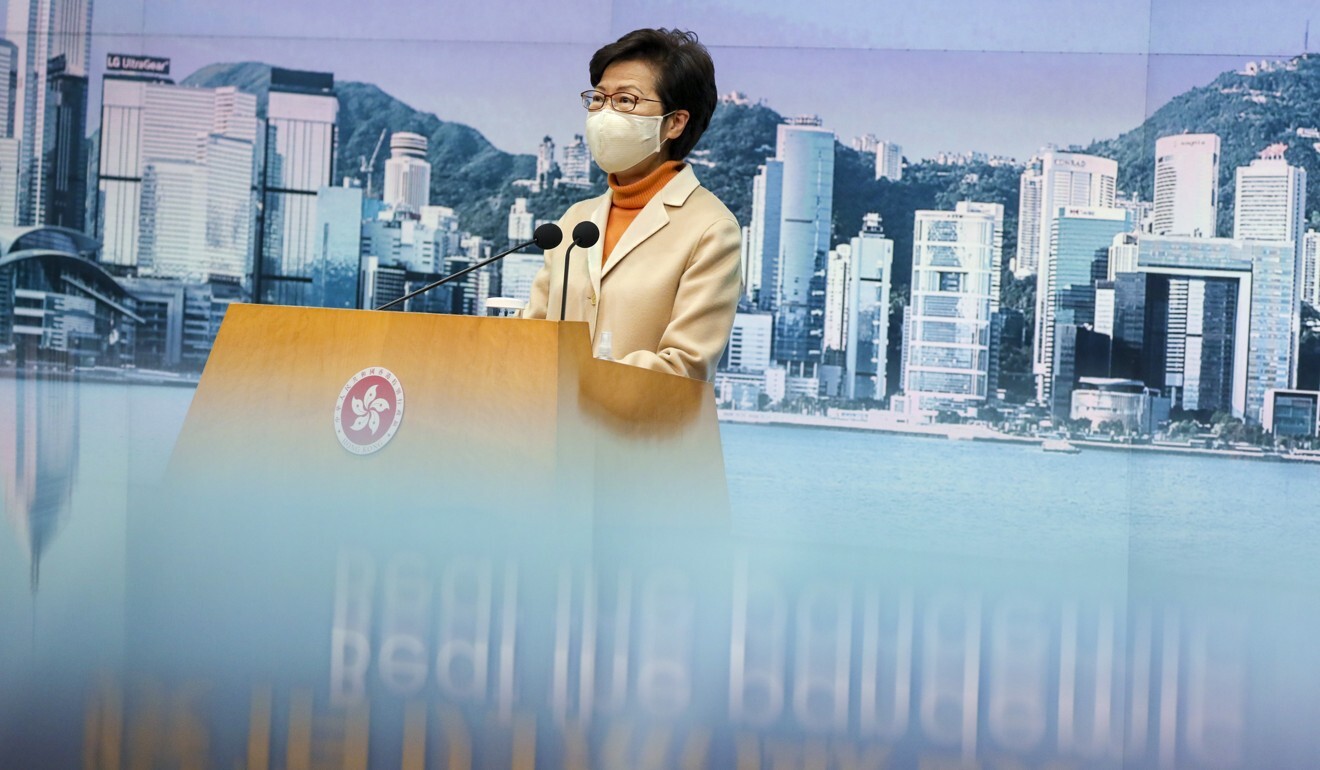
Hong Kong leader Carrie Lam says ‘weaponising’ of information made car database search alerts necessary, won’t undermine media work
- New system that lets vehicle owners know who has accessed their information could be duplicated by other public registers, according to Lam
- Journalists’ group has argued programme will only serve to tip off public figures being investigated by local outlets
The Hong Kong Journalists Association had called on the government to exempt news gathering from the new system, saying it represented an attempt to suppress investigative journalism and would tip off public figures being probed by local outlets.

But Lam, speaking ahead of her weekly Executive Council meeting, brushed off those concerns, emphasising the need to protect residents’ privacy after so much personal data “had been weaponised” over the past two years.
“As a government body, we have to ensure the privacy of these people, especially when we have seen in the past one or two years that many who were inspecting public registers got hold of personal data and [used it for] all sorts of intimidation, including doxxing,” she said.
New service allows car owners to find out who accessed their details on database
In November, the prosecution of a freelance journalist who used the city database to search for vehicle information for an RTHK programme sparked widespread condemnation among media groups, scholars and opposition politicians, who accused police of using the law to suppress normal reporting activities.
Local newspaper Apple Daily also said on Monday it had received a letter from police requesting details of the reporter and researcher linked to a car accident news report last November that involved details of a vehicle owner.
A police source said officers from the Cyber Security and Technology Crime Bureau launched the investigation into a possible violation of the Road Traffic Ordinance after receiving a complaint.
But the source added police had also sent a letter to pro-Beijing newspaper Ta Kung Pao asking for information in relation to another car search case, also upon a complaint, and the force was not targeting or intimidating individual news organisations.
Though they declined to confirm the specifics of the investigation, police acknowledged the bureau was looking into a case related to the ordinance.

The new alerts service, which took effect on January 2, notifies car owners via email if their personal details have been accessed on a government database. Individual owners will have to register online for the service, and as of Monday, 14 users had done so.
The free notification service would provide the searchers’ personal particulars, such as their name and the purpose, time and date of the search. If the registered car owners suspect their personal data has been misused by the applicant, they can contact the Office of the Privacy Commissioner for Personal Data or police.
The Transport Department said the notifications would allow vehicle owners to “take precautionary measures” against the abuse of their personal information.
Lam, meanwhile, maintained the change was nothing more than notifying people “that somebody has checked your personal data”, insisting it was “very reasonable and not over the top”.
“I really do not see how this would undermine the work of the media, and hence I do not see why the media should be exempted from the administrative procedures,” Lam said, adding she did “not see that it will affect the freedom of the press”.
Other departments that oversee public registers were also weighing the legal provisions and nature of the data involved to determine whether more regulations were required, she added.
An Immigration Department spokesman said it would from time to time review the arrangement of public services, including application procedures for searching public registers and obtaining certified copies.
The Post has also reached out to the Land Registry and the Company Registry on planned measures.
Why an RTHK journalist was arrested, and what that could mean for reporting in Hong Kong
Responding to Lam’s comments, Ronson Chan Ron-sing, vice-chairman of the Hong Kong Journalists Association, said that rather than protecting those who were being investigated, the government should facilitate the press in conducting searches on its databases.
“We call on the chief secretary to discuss with the press how we can safely conduct searches of the government database without running afoul of the law,” he said.
“There should be an option [to select] ‘news reporting’ when we submit our requests. The government should address our concerns about conducting investigative journalism so as to enhance press freedom.”
The Democratic Party’s Lo Kin-hei accused Lam of trying to confuse the public, saying the new measure would undoubtedly tip off people under investigation by the media.
“It will be more difficult for the press to expose scandals in the political and business fields in the future,” he said. “The previous arrest and prosecution of the journalist for conducting a search is clear proof of the suppression of press freedom.”
A spokesman for the city’s privacy watchdog backed the new measures, but reminded the government to also protect the personal details of database users, including those of journalists, while alerting car owners that searches had been conducted on them.
The users of the public register must be “explicitly informed of the purposes for which the data is to be used” and “to whom the data may be transferred”, the Office of the Privacy Commissioner for Personal Data said in a reply to the Post on Tuesday.
Additional reporting by Cannix Yau


